12 Jun2019
By Deborah Koolbeck

As we transition into summer in the northern hemisphere, timing for the U.S. Congress gets tight and tighter. August recess looms with a short time frame to wrap up the work on the Fiscal Year 2020 appropriations process in September. How many of the 12 bills waiting to be passed will be completed by September 30? How many agencies will operate under a Continuing Resolution? Will there be a deal to raise the caps on non-defense and defense discretionary spending? When will the federal government reach its debt ceiling and how does that impact the appropriations process? And what is unfolding with the reauthorization of the Higher Education Act?
The AACTE June 2019 Federal Update webinars will share the latest on these questions in this members-only opportunity. Plus there is always time to get your questions answered at the end of the webinar, including topics or happenings that were not covered in the update.
We offer the webinar on two different days and at different times to accommodate schedules and time zones, and we will also post a recording on the AACTE Advocacy Center’s federal page so you can stay in the know even if you cannot attend in person.
Register today!
Tuesday, June 18, 5:00 – 6:00 p.m. EDT
Wednesday, June 19, 11:00 a.m. – 12:00 noon EDT
10 Jun2019
By Jane E. West
This blog post is written by AACTE consultant Jane West and is intended to provide update information. The views expressed in this post do not necessarily reflect the views of AACTE.
After a 10-day Memorial Day recess, Congress returned for a brief three-day session and then hit the road again. They will roar back into town next week with a plate full of funding issues to address.
- Budget and Appropriations: House on the Move!
The House
Democrats are vigorously exercising their hard-won majority in the House by moving rapidly on spending bills for FY 2020. By early next week all 12 appropriations bills will have moved through Committee markups and be ready to go to the House floor. House leadership has announced its intent to see all 12 bills passed by the end of June!
10 Jun2019
By University of Tennessee News

This article and photo originally appeared on the University of Tennessee News website and are reprinted with permission.
A new program aimed at increasing the number of licensed teachers from diverse backgrounds will launch this summer in the College of Education, Health, and Human Sciences.
The program, Increasing Teacher Equity to Address Community High Needs (I-TEACH), is funded by a Tennessee Higher Education Commission grant recently awarded to the college to support diversity in education and to fill critical teaching shortages across the state. The two-year program supports 12 eligible teacher candidates for 33 hours of coursework and clinical practice. Candidates who complete the program will graduate with a master’s degree in teacher education.
10 Jun2019
By Jacqueline Rodriguez

I recently represented AACTE at the Next Educator Workforce: Asking the right questions conference, joining educators from across the country at the Arizona State University (ASU) Mary Lou Fulton Teachers College (MLFTC).
The ASU conference organizers asked the question: Why convene around the idea of the next education Workforce? The response included the following:
- Fewer people are entering the profession.
- More educators are leaving the profession early.
- Educators need more of the sustaining rewards of adult collaboration and efficacy.
Our challenge, according to ASU, is to build broad-based, multilateral partnerships that include colleges of education, schools, districts, and communities committed to designing and fielding new workforce models that make education work better for both educators and learners.
10 Jun2019
By Rosanne Luu
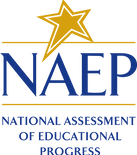 Greetings from the National Assessment of Educational Progress (NAEP) 2025 Mathematics Framework team at WestEd. NAEP, also known as the Nation’s Report Card, measures student achievement in elementary and secondary schools. Public review of the Mathematics Framework draft is underway, and we would like you to be aware of the offerings for stakeholder groups to become informed and, if you haven’t already, provide input on this important document.
Greetings from the National Assessment of Educational Progress (NAEP) 2025 Mathematics Framework team at WestEd. NAEP, also known as the Nation’s Report Card, measures student achievement in elementary and secondary schools. Public review of the Mathematics Framework draft is underway, and we would like you to be aware of the offerings for stakeholder groups to become informed and, if you haven’t already, provide input on this important document.
First, the Mathematics Framework draft, along with further information about NAEP, can be accessed at FNAEPFrameworkUpdate.org. By clicking the “Framework Draft” tab, interested parties can receive directions on how to download, comment on, and upload the draft. AACTE has reviewed the draft framework and provided feedback to NAEP. The draft was available for comment through June 7, 2019.
Additional background information on this work can be found on our website. For example, on April 25, 2019, Suzanne Wilson from the University of Connecticut and Mike Shaughnessy from Portland State University discussed their work on the NAEP Mathematics Assessment Framework on the Math Ed podcast. Also, upcoming opportunities to engage with the draft Framework, such as webinars with members of the Council of Great City Schools, are located on the Outreach Events tab.
10 Jun2019
By Deb Lecklider
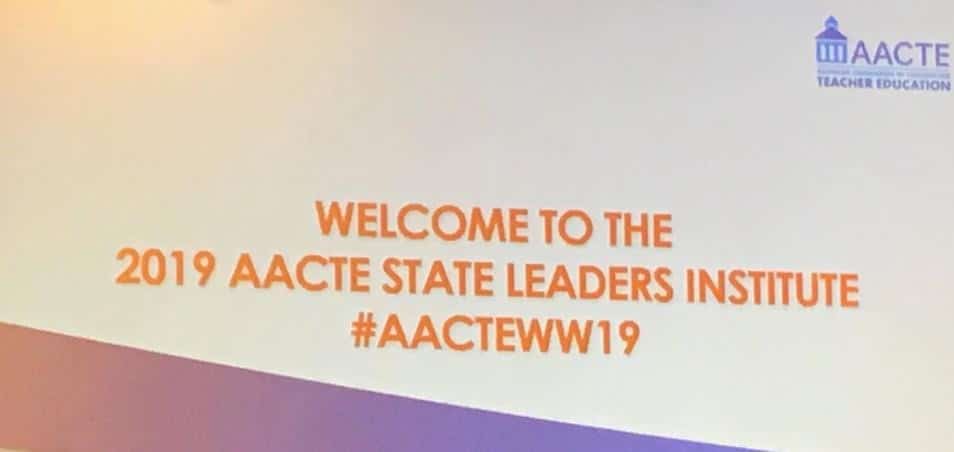
It’s all about people! Being at AACTE’s State Leaders Institute (SLI) on Day one was a true networking opportunity. Starting the day off with a chance to get to know state chapter leaders and AACTE staff members was a highlight of the day. Spending time learning about the leaders who represent educator preparation programs throughout the country is important to all of us.
The moment I walked into SLI 2019, the AACTE staff welcomed us with open arms and immediately provided us with opportunities to network. Regional teams were able to meet and talk about communication initiatives for future monthly conference calls. In addition, we shared ideas on what each chapter provided. The discussion was so robust that we ended up creating a matrix for AACTE to collect pertinent information on each of our chapters so we all have access to the data. Another example of networking was when one chapter leader from Illinois shared their legislative regional team idea where members advocate for education preparation programs at the statehouse.
10 Jun2019
By Ward Cummings
It was another successful Washington Week as AACTE members, students, and partners descended on the nation’s capital to network, advocate, and augment the 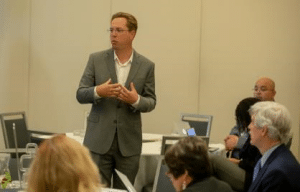 capacity of the profession at the table. There was something for everyone—whether they were attending Washington Week for the first time or were a perennial attendee.
capacity of the profession at the table. There was something for everyone—whether they were attending Washington Week for the first time or were a perennial attendee.
Three signature events comprise AACTE’s Washington Week: the State Leaders Institute (June 2-3), the Holmes Doctoral Scholar Summer Policy Institute (June 3), and Day on the Hill (June 4-5). Kim Metcalf, chair of the AACTE Board of Directors, and Michael Maher, chair of the AACTE Advisory Council of State Chapters, kicked off the week of events opening the State Leaders Institute (SLI).
Focusing on building the capacity of the state chapter and its leadership, SLI attendees learned about the impact of their state’s political dynamics on the development and advancement of education policy. Diving into the challenges of chapter leadership, SLI sessions included the development of sustainable leadership pipelines and the recruitment and retention of chapter membership. Conversations and sessions covered ideas and practices on a host of important issues of interest to AACTE members, including how to attract more teachers to the profession, how to use social media to augment the presence and voice of the chapter and its membership, and how to employ the power of grants to meet state and regional chapter goals.
10 Jun2019
By Jeffrey Johnston
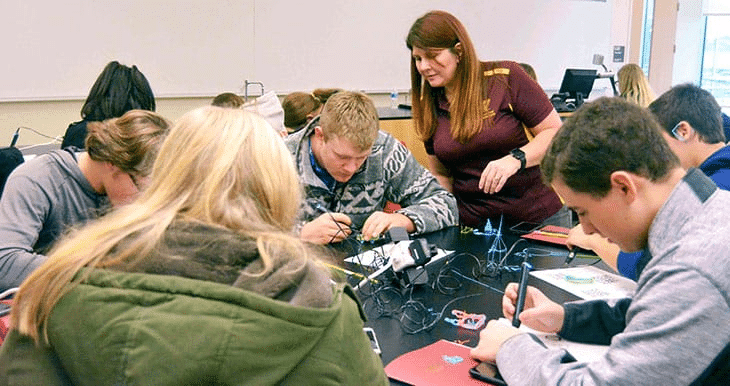
This article and photo originally appeared on the Central Michigan University website and are reprinted with permission.
What can you add to 688 to total 958?
In Central Michigan University’s teacher education programs, the answer is one year: From fall 2017 to fall 2018, admittance and enrollment in teacher ed grew from 688 students to 958, a 39% increase.
To Betty Kirby, acting dean of CMU’s College of Education and Human Services, the explanation is simple.
“CMU is the place to come for excellent teacher preparation,” she said, “and now is a great time to become a teacher.”
03 Jun2019
By Jerrica Thurman
Are you following what’s happening at AACTE’s Washington Week on Facebook and Twitter at #AACTEWW19? Tune into the daily Facebook Live Shows on the AACTE Facebook page and hear in real time what attendees have to say about the key signature events, session topics, networking, and pressing issues in educator preparation. You can watch these videos of the Facebook Live Shows from the past two days of the event:
Sunday, June 2
Monday, June 3
02 Jun2019
By Jerrica Thurman
(June 3, 2019, Washington, D.C.) – The American Association of Colleges for Teacher Education (AACTE) is convening its annual Washington Week, themed “Your Voice Matters,” June 2-5 at the Renaissance Arlington Capital View Hotel in Arlington, Virginia. Teacher educators, college students, and representatives from K-12 schools and national education organizations have united at the conference to amplify their voices on federal and state policies affecting educator preparation. During the sessions, attendees hear the latest updates on national education trends and receive advocacy training in preparation for their congressional meetings on Capitol Hill June 5 to advocate for educator preparation.
“AACTE state chapter leaders, Holmes Scholars students, and colleges of education administrators from across the nation have gathered at AACTE’s event this week to advocate for the future of education,” said Lynn M. Gangone, AACTE president and CEO. “We are here to raise our collective voices and petition our Members of Congress for their support to help solve teacher shortages, increase teacher diversity, and maintain teacher and students’ safety in the classroom among other pressing issues in educator preparation.”
30 May2019
By New Mexico Highlands University
This article originally appeared on the New Mexico Highlands University website and is reprinted with permission.
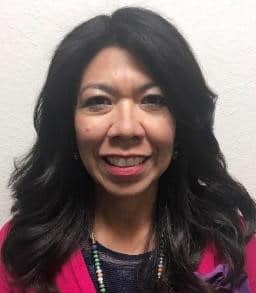 Elisabeth Valenzuela is the first coordinator for the Regional School Partnership, a collaboration among Pojoaque Valley Public Schools, Los Alamos National Laboratory and New Mexico Highlands University that aims to support improved teaching and learning.
Elisabeth Valenzuela is the first coordinator for the Regional School Partnership, a collaboration among Pojoaque Valley Public Schools, Los Alamos National Laboratory and New Mexico Highlands University that aims to support improved teaching and learning.
The innovative partnership, launched in October 2018, is the first of its kind in New Mexico to combine a school district, a major employer and a university teacher education program. It focuses on increasing success for youth in grades 4 through 8.
“The clinical residency program is the most exciting element of this new partnership,” Valenzuela said. “Pre-service teachers who are students in the Highlands School of Education will spend their junior and senior years working three days a week co-teaching a classroom in Pojoaque schools. These college students will work under the mentorship of a highly qualified teacher.”
Valenzuela said Los Alamos National Laboratory has a history of working with Northern New Mexico school districts to improve teaching and learning.
30 May2019
By Ward Cummings

The Education Commission of the States (ECS) recently released a report regarding college campus safety policies, based on its research gathered from statutes in all 50 states, the District of Columbia and Puerto Rico. Though it does not include postsecondary board or institutional policies, the 50-State Comparison: Postsecondary Campus Safety report provides an overview of relevant laws in each state. However, this resource does not reflect on how these laws may interact with other state or federal policies.
Key takeaways from the report include the news that 22 states have codified a campus sexual assault policy; five states have defined affirmative consent; and 22 states have written into statute a prohibition for individuals to carry firearms on public college or university campuses.
This resource reviews state statutes that explicitly address sexual misconduct on college campuses or off-campus incidents that involve at least one student. It also examines state statutes that explicitly allow or prohibit guns on college campuses and those states in which statute allows guns in locked vehicles on college campuses. Follow this link to download and review this important report.
For questions about this announcement or other offerings by ECS, please email me at wcummings@aacte.org.
30 May2019
By Timothy Drake

“Wait, what happened?!?”
“I had to help deliver a baby today.”
“You what!?!”
In the first day of her full-time residency, Jennifer Wilker had to help one of her teachers deliver her baby. Jennifer was in Warren New Tech High School, which is located near Norlina—a small, rural town in northeastern North Carolina that is over 30 miles from the Halifax Regional Hospital.
Though this seems like an extreme example, principals all over the country will no doubt smile, knowing that Jennifer’s experience isn’t too atypical.
30 May2019
By Brandon R.T. Frost
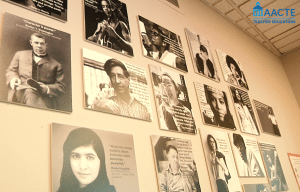
Portland State University’s Graduate School of Education offers a unique, two-year, full-time master’s degree in secondary dual education. In 2014, the Department of Curriculum and Instruction and the Department of Special Education joined together to meet the need of the surrounding communities to increase the number of teachers who are skilled in effective practices for a variety of students. Graduates of the program are equipped to implement inclusive and equitable practices.
“The secondary dual education program in the Graduate School of Education really represents, I think, innovation, collaboration, and equity and inclusion at its highest levels,” says Marvin Lynn, dean of the Graduate School of Education at Portland State University. This particular program was born out of need to ensure all teachers are meeting the needs of all students in the classroom. The emphasis on diversity and equity is part of the Graduate School of Education’s strategic mission as an access university.
30 May2019
By Jennifer Babich
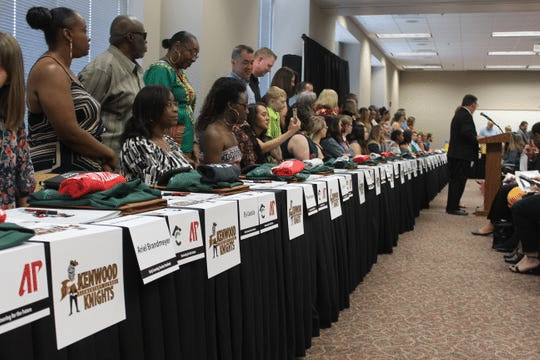
The first class of residents in the Early Learning Teacher Residence program, a partnership between Austin Peay State University and the Clarksville-Montgomery County School System, wait to sign their contracts on May 24, 2019. (Photo: Jennifer Babich)
This article and photo originally appeared in the Leaf Chronicle and are reprinted with permission.
These are not your typical college students.
Instead, they’re the first class of aspiring professionals embarking on a free three-year residency and degree program to turn themselves into teachers, as part of a partnership between Clarksville-Montgomery County Schools and Austin Peay State University.










 Greetings from the National Assessment of Educational Progress (NAEP) 2025 Mathematics Framework team at WestEd. NAEP, also known as the Nation’s Report Card, measures student achievement in elementary and secondary schools. Public review of the Mathematics Framework draft is underway, and we would like you to be aware of the offerings for stakeholder groups to become informed and, if you haven’t already, provide input on this important document.
Greetings from the National Assessment of Educational Progress (NAEP) 2025 Mathematics Framework team at WestEd. NAEP, also known as the Nation’s Report Card, measures student achievement in elementary and secondary schools. Public review of the Mathematics Framework draft is underway, and we would like you to be aware of the offerings for stakeholder groups to become informed and, if you haven’t already, provide input on this important document. 
 capacity of the profession at the table. There was something for everyone—whether they were attending Washington Week for the first time or were a perennial attendee.
capacity of the profession at the table. There was something for everyone—whether they were attending Washington Week for the first time or were a perennial attendee.
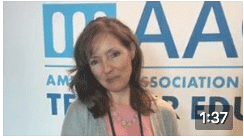
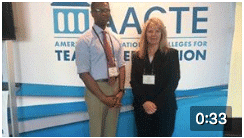
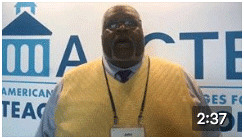
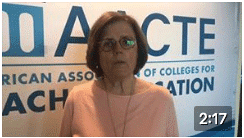
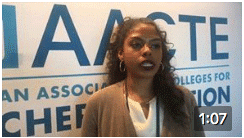
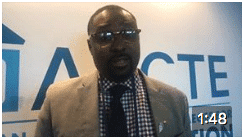
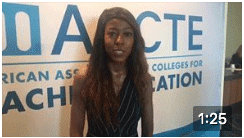
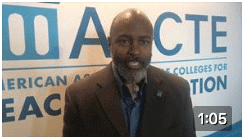
 Elisabeth Valenzuela is the first coordinator for the Regional School Partnership, a collaboration among Pojoaque Valley Public Schools, Los Alamos National Laboratory and New Mexico Highlands University that aims to support improved teaching and learning.
Elisabeth Valenzuela is the first coordinator for the Regional School Partnership, a collaboration among Pojoaque Valley Public Schools, Los Alamos National Laboratory and New Mexico Highlands University that aims to support improved teaching and learning.


